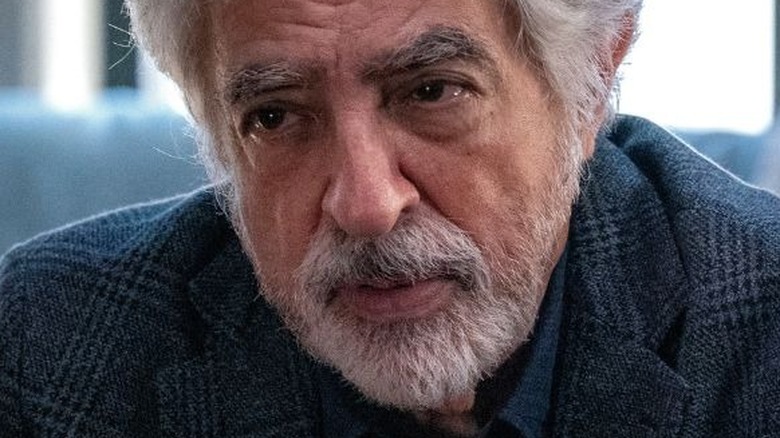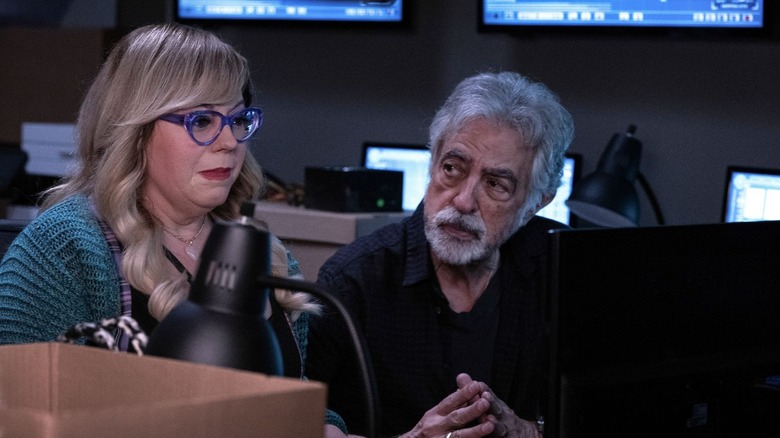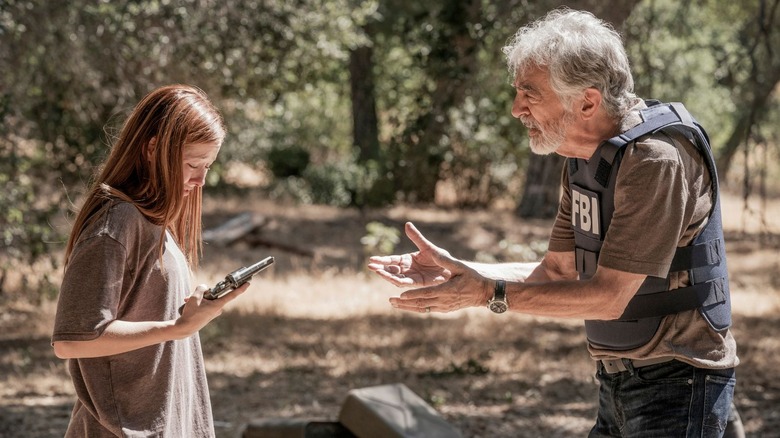Criminal Minds: Evolution Exec Relates Rossi's Grief To Everyone's Post-COVID Lives
In its strongest moments, "Criminal Minds: Evolution" feels like the "Star Wars: The Empire Strikes Back" or "The Godfather: Part II" of the "Criminal Minds" universe — a sequel that, every so often, engages with its subject matter on a deeper, darker level than its predecessor ever could. Almost everything about the new Paramount+ drama feels deliberately bleaker, more gruesome, and at times refreshingly urgent. As a consequence of this slight departure, "Evolution's" returning characters are given equally dark storylines, chief among them being that of Joe Mantegna's Detective David Rossi.
As fans learn in the series premiere, Rossi's wife — Gail O'Grady's Krystall Richards, who first appeared in the original series' 13th season — has died sometime during the three years since the "Criminal Minds" series finale. Seeing Rossi's newfound obsession with a particular homicide investigation, hastier fans may briefly assume she was murdered by one of the BAU's "unsubs." It is later revealed, however, that her death was the result of an illness.
While the show seems to be intentionally playing its cards close to the chest with this storyline, showrunner Erica Messer spoke with Deadline about how Krystall Richards died and how the nature of her death weaves into "Evolution's" central themes.
How COVID changed the world of Criminal Minds
In her interview, Erica Messer confirmed that Krystall Richards' death was the result of a cancer battle exacerbated by the COVID-19 pandemic. A fascinating (and entirely trivial) consequence of the pandemic is that writers, producers, and directors often have to decide whether or not COVID happened within their respective fictional universes. As CNN noted in February of 2021, television shows that once strived to portray mostly realistic stories were suddenly grappling with how to address a global historical event that most viewers wanted an escape from.
As a result of either time or sheer conviction, "Criminal Minds: Evolution" has made the bold choice to weave the pandemic into the fabric of its first story arc. Lockdown brings out the best and the worst of humanity in the world of "Criminal Minds" — Penelope Garcia (Kirsten Vangsness) used the time to address how her work was affecting her mental health, while the isolation forced Elias Voit (Zach Gilford) to become a more cunning, dangerous killer.
Though less blatant, Dave Rossi's struggle with the aftermath of COVID is perhaps the most visible and difficult to witness. This grim reckoning was necessary for Messer to bring to the series, given what the audience has dealt with in the past few years. "I feel like it was important to have a representation of the grief that so many of us have experienced since the show ended ... " she said. "I mean, it might not have been Covid related for you at all, but all of us have loved and lost ... in our lives. For [Mantegna] to bring that heartache and grief into this season, a lot of people could [relate]."
Rossi's journey is the emotional centerpiece of the series
For Dave Rossi and Krystall Richards, COVID-19 prevented doctors from detecting her cancer early enough to intervene. "You couldn't really go to the doctor unless it was an emergency situation," Erica Messer recalled of the early days of the pandemic. "One of [Richards'] yearly exams got put off and when she finally got to the doctor, they found cancer and it was advanced and it was too little, too late." Her death traumatizes Rossi, who chooses to dissolve into his work rather than take time to heal.
The Voit case forces Rossi to rejoin his team at the BAU, allowing him to consider their perspectives on grief. Penelope Garcia cautions Rossi about ignoring the trauma they passively absorb on the job, while Emily Prentiss (Paget Brewster) shares a particularly poignant piece of advice from her former mentor Jason Gideon (Mandy Patinkin), whom Rossi replaced nearly two decades ago.
These blows to Rossi's abrasive, injured exterior lead to surprisingly effective moments of self-reflection and vulnerability, such as the climax of the series' first episode. After obsessive spree-killer Rory Gilcrest (Sebastian Schier) nearly kills an entire family, Rossi comes face to face with the sole survivor — a young girl who is emotionally broken and on the brink of taking her own life. Rossi is able to connect with her, delivering a speech that Messer feels evokes the collective pain and loss felt by an overwhelming amount of people post-pandemic. "It's really a nod to all of us who have lost someone and ... are left still needing to live and not wanting to give up," she said. "The advice he's giving her is the advice he needs to be taking himself."


